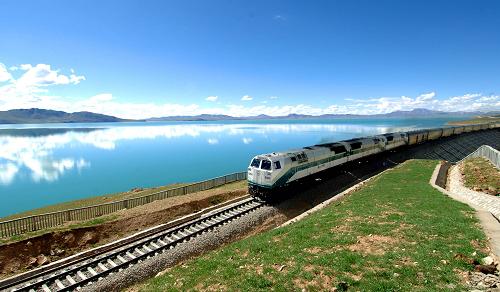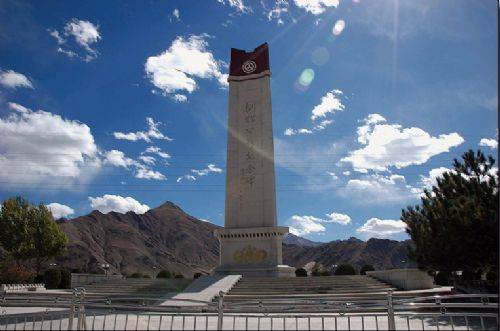

Over the years, the Qinghai-Tibet Highway has greatly boosted the region's economic growth.

Throughout the years, nearly 800 soldiers have given their lives on the Qinghai-Tibet Highway, which means that for every two and-a-half kilometers, one soldier would be killed on duty.
2014 marks the 60th anniversary of the completion of the Qinghai-Tibet Highway, the world's highest road. Over the years, it has greatly boosted the region's economic growth. It's also a crucial supply route for troops stationed in Lhasa.
Supply missions on the "roof of the world"start with a grand farewell ceremony. Around 200 soldiers will man this convoy of 100 military trucks. From their comrades-in-arms—a solemn salute. From their families—an emotional goodbye.
The mission is peaceful, but it's one of the most dangerous for Chinese soldiers. Before their departure, Li Tao, head of his platoon, does a final check. He has done this mission for more than a decade, driving the route around 90 times.
Li says every step of the journey must be taken with great caution. Their enemy – the weather – is unpredictable.
"The weather on the way could change drastically at any time. After we reach the snowline, heavy snowstorms can be very dangerous for our driving. To make it worse, a severe lack of oxygen could also make drivers find it hard to focus. Each time we are fighting a battle of life and death against nature," said Li.
A few hours ago, we caught up with Li Tao putting military supplies onto truck. The goods range from basic necessities like rice and cement, to those we are not entitled to film.
All of them get shipped into Lhasa, the remotest city of China, along the Qinghai-Tibet highway. The road is called "The Lifeline of Tibet." Most of the goods entering or leaving Tibet travel this road 4,000 meters above the sea.
This mission requires great sacrifice by army families. For the past 13 years, Li Tao and his wife have spent more time apart than together.
His missions are military secrets. Li can only inform his wife that he is leaving a few hours before his departure.
A simple meal with dumplings – a traditional way for Chinese to say goodbye; it is the only thing she can do for him.
It is said that a wife of one soldier missed her husband so much during one New Year's Eve she brought their baby onto the plateau to look for him, only to have their child die because of the extremely thin air.
"The closer he gets to Lhasa, the more dangerous the journey becomes. Each time as he departs, I am in fear of losing him. With one mission after another, it's a never-ending torment," said Guan Huanli, Li Tao's wife.
Just a few kilometers away from where Li Tao departed lies a martyrs' cemetery. Standing in front of the tombs, it's hard to believe so many soldiers could be killed in peacetime.
Most of them die on duty, because of the extreme conditions at such high altitudes. Fatal traffic accidents also take lives.
Throughout the years, nearly 800 soldiers have given their lives on the Qinghai-Tibet Highway, which means that for every two and-a-half kilometers, one soldier would be killed on duty. For those who are still in service, the army says all of them above the age of 27 suffer various diseases caused by the lack of oxygen on the plateau.
Despite these odds, Chinese soldiers drove fearless on into the sky road. We followed Li Tao all the way to Lhasa. In the next episode, we will be see his troops struggle against Mother Nature at her most unforgiving.
The plateau is as brutal, as it is beautiful.
Copyright ©1999-2018
Chinanews.com. All rights reserved.
Reproduction in whole or in part without permission is prohibited.